|
Continuing Veterinary
Education
KNOW THE BASICS TO BE SUCCESSFUL IN YOUR LIFE
Dr Sing Kong Yuen, BVMS (Glasgow), MRCVS
June 19 - 21, 2008 Xiamen, China
An abalone farm operation occupying areas
possibly 5 times bigger than Singapore's
Sentosa Island? It is hard for the average
Singaporean to imagine the vast size of the
abalone operation of Oceanus, a company
listed on the Singapore Stock Exchange in
2008.
I asked Dr Ng Cher Yew, the executive
Chairman of Oceanus if he could permit me to
visit the farms in Jun 2008.
Although I am a small animal veterinarian, I
love knowing more about farming operations
as part of my continuing veterinary
education. Seeing other farming operations
are refreshing for the mind and successful
ones such as a
intensive pig production in Hainan are
educational.
Such visits of successful agricultural
operations unrelated to my small animal
surgery often give me new perspectives and
introduce ideas which may be applicable to
my small animal practice.
In this abalone farm visit, a second-year
Murdoch University vet student accompanied
me. This would be a rare opportunity for him
to see veterinary medicine in action.
Making veterinary knowledge alive to a vet student
is not always practical for a University as
there are constraints of time and money and
the availability of operations to view.
I wanted this 22-year-old youth to see the
real world of farming operations - the
challenges and solutions in large food
producing operations. In the process, he
might
appreciate the breath and depth of
veterinary medicine first hand.
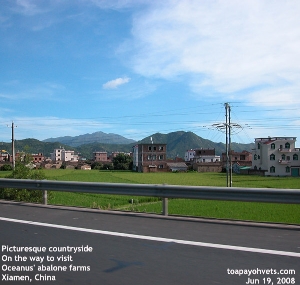 |
|
Xiamen, China in summer is more
beautiful than Singapore
|
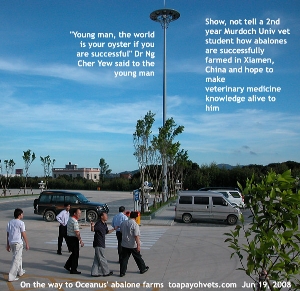 |
|
A young man starts a journey to become a
vet
|
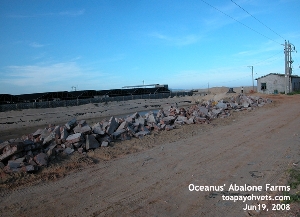 |
|
Abalone farms must be near the sea to be
cost-effective
|
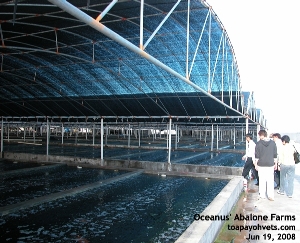 |
|
Tanks full of abalones
|
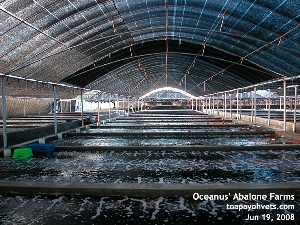 |
|
Sea water must be of the highest quality
for abalones. Sea is equivalent to air for people
to live and thrive |
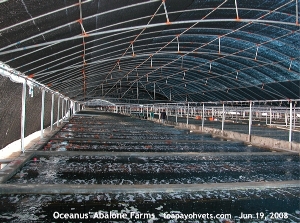 |
|
Well aerated sea water with the right
temperature |
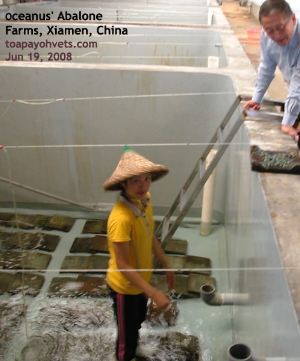 |
|
Baby abalones
|
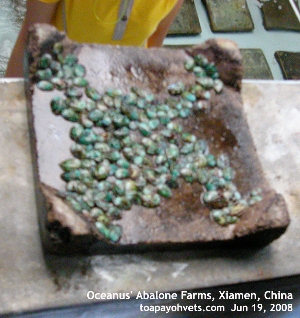 |
|
Baby abalones growing on tiles
|
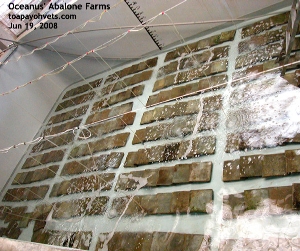 |
|
Tiles are homes to baby abalones
|
Aquaculture will be one subject of study,
possibly. I hope he would then recall his
visit to China and find his lectures much
more fascinating and relevant in a world of
rising commodity and food prices.
We visited 4 farms near the sea with Dr Ng.
Each farmland was big and would take at least 2
hours if we were to walk and see every tank.
These 4 farms total an area probably 1
Sentosa Island and Oceanus is said to have
more than 20 of such farms. That would
conservatively be 5 times as large as
Sentosa Island but I am not sure of the size
of the farms. Singapore's high technology
agri-parks in Pasir Ris and Lim Chu Kang
combined look miniscule in size in
comparison.
We were fortunate as Dr
Ng, a veterinary graduate of Murdoch
University some 20 years ago had time.
He explained to
us abalone farming in English. In China,
communication is in Mandarin or the Chinese
dialects and English-educated Singaporeans
may not be fluent in Mandarin.
We arrived on Jun 19, 2008. Xiamen city
looks modern with numerous construction
projects of apartments. The streets are free of
litter. After a lunch in which I remember
that the clam was tasty and of good quality, we drove to the
farms situated some 2 hours from Xiamen
downtown. We visited 3 coastal farms on
Jun 19 and one on Jun 20.
"How are abalones raised in the farms?" I
wanted to know during a breakfast on Jun 20,
2008. There were so much about farm-raised
abalones I would like to know as Singapore is
a small country and does not have intensive aquaculture
and the few chicken farms are off-limits to
the average Singaporeans due to "bird flu"
disease precautions.
"Excellent quality of
the sea water is important for abalones,
just like clean air is important to people
and animals. If you can master the basics of
how to keep the sea water of the highest
quality, you can be
successful in this abalone farming."
Fortunately he had
time to present a long after- breakfast talk to the
22-year-old boy from Murdoch University,
elaborating on many factors essential to
success in a large-scale business, life or
career.
He is a natural motivational speaker
if he wants to be one as he is backed
up by around 15 years of hands-on China experience
in the commercial world.
"If you are successful, the world is your
oyster," he told the young man after
explaining
the dog-eat-dog world of business where
lowest selling price but highest quality of
the abalone are the determining factor in
sustained profitability in the global
market. Size of the production matters as
there is economies of scale.
How should a young man start out to be an
entrepreneur?
"The best
age to venture out to do your business is
around 30 years of age when you are more
mature" Dr Ng said. "You learn and network by working for
a multi-national company after graduation
for a few years. Then you start your own
business.
You have nothing to lose at this age."
|
Dr Ng continued, "When
you are in your 50s and are still working in
a multi-national company, you are too highly
paid. You worry about your job as the
younger employees will replace you.
"These young
ones cost less to employ and they work much
harder than you. Soon you become redundant.
"Nobody wants to employ you as you are too
highly qualified and unaffordable. If you
accept a lower salary, you will not stay
long in the company."
"So, those over 50 years old can never make
it as successful entrepreneurs?" I asked.
"Unlikely," Dr Ng said.
"Of course, if you have a good professional
degree," Dr Ng laughed as he nodded towards
his slim accountant beside him, "You
can never be unemployable."
He had a good accountant. She was a quiet
slim lady who was present for the board
meeting in Xiamen. She must be good in her
professional job otherwise she would have
been retrenched.
The commercial world is
brutal. Laggards, inclusive of professionals
who are employees can be out of a job as the
commercial world demands performance and is
not charitable towards weaklings.
It is a ruthless world of the big fish
eating the small ones, as in nature. Only
that in the human predatory world of
commerce, there is the acquisition and
mergers of small companies by the big boys
such that it is better for a small company
to be a small fish in the sea rather than
being a big fish in a pond.
"How about working for the state
veterinary department after graduation?" I asked as I
had to work for the government for 8 years
after graduation to serve out a bond.
"Civil servants are not close to the
customers," Dr Ng said. "So, it is hard to
gain the relevant sales and marketing
experience that contribute so much to
(entrepreneurial) success."
This breakfast meeting was worth a lot of
money to management trainees and those
interested in business in China as much
advices not printed here were dispensed by
Dr Ng.
Dr Ng looked at the young man and said, "Ask
Why Not?
Just because a procedure is done
successfully, it does not mean that it
should carry on as usual. There may be
better ideas to cut down the costs of abalone
farming and processing. Cost competitiveness
is the keyword to success and if the product
is not competitively price, nobody will want
to buy it in large amounts."
Behind every successful entrepreneur, there
are thousands of failed ones. It was
fortunate that this young Murdoch University
student was given some tips from a successful veterinarian.
This Xiamen trip opens up my mind. Back to the basics.
What are the basics? One
must know what are the basics to be
successful.
Mastering the basics of any venture/career
work/study is important. But the person must
know how to do it. How to execute the ideas
successfully is the most difficult
challenge.
P.S.
Did this young man learn anything about
being successful in a career or business
after the Xiamen trip?
On July 11, 2008, the young man wanted to
borrow his mum's mobile phone as his phone's
batter was drying up and he was meeting his
friends for dinner at the Ang Mo Kio hub at
7.00 pm.
His mum was reluctant to part with her
phone. I said to the young man, "Ask her why
she would not lend you the phone?"
"No," he said. "Ask why not?" I was testing
him and he had actually remembered this
portion of Dr Ng's lecture.
P.S. "Why Not" is a book interesting to
business people - I can't remember the
author.
SOME TECHNICAL INFO WHICH NEEDS TO BE
CONFIRMED LATER.
Many abalone farms failed because the water
quality supplied to the abalone was poor
quality. For example. the outgoing sea water
gets discharged near the incoming sea water
meant to fill the tanks. This basic
applies to all aquaculture and when the
farmer loses sight of the basics, the
farming business fails.
Breeding stock - not from Oceanus farms.
Sourced from elsewhere. Reared in an island.
Rearing stock - not used as breeders to
prevent inbreeding and therefore poor quality stock in future.
First 2 months after hatching. Baby abalone
attached to the plastic films for the first 2 months. Sea
water and formulated feed. Mortality may be high if conditions
are not right.
Month 2-8. Abalone put on tiles. They attach
to the tiles by suckers. Cull poor growing ones.
Sea water and formulated feed.
Month 8. 35 abalones put inside cages.
Ideally, should be around 30 pieces. 8 cages per column. Sea
water within 6 hours to fill up tank. Seaweed fed. New seaweed
once a week. Water changed 20% per day but whole water change
once a week.
Seaweed sourced, delivered to farm. Checked.
Kept in a tank for a few days. Ensure no crabs as they eat the
abalone.
Nets to cover up the tanks to prevent heat
during summer. Xiamen is not very cold. Around 3 typhoons per
year but no effect on abalone farming. Strong sea breezes
ensure strong currents which remove waste and bring in oxygen
and maintain a excellent water quality.
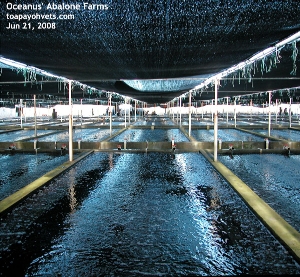 |
|
Nets, rather than solid roofs are
cost-effective
in keeping the abalones cool in summer |
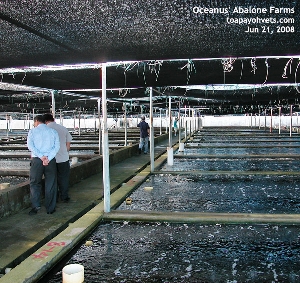 |
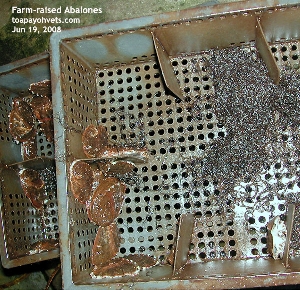 |
|
Abalone Farming in Xiamen, China.
Older abalones in cages, probably 1 year
old?
|
|
|
|
Copyright ©
Asia USA Realty
All rights reserved.
Revised: July 11, 2008 |
|
Community Education:
Be
Kind To Pets |
|
Home |
|
|
|